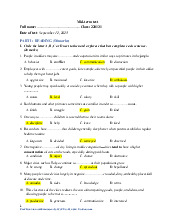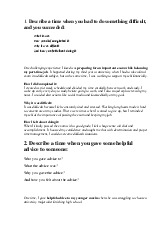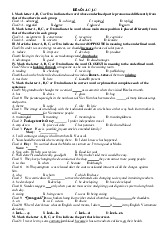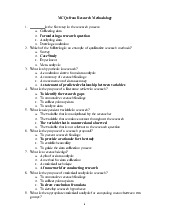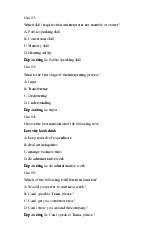
















Preview text:
UNIT 16: ORGANIZATIONAL BEHAVIOR
Câu1 (2 điểm): Choose the best word to fill in each gap
1. The traditional field of management is defined as the process of planning,
……………., leading and controlling the human, material and financial resources of an organization. A. supervising B. organizing C. executing D. developing
2. ………………. are individuals who achieve intended organizational objectives by
selecting and deploying at the right time and at the right place the processes noted. A. Managers B. Employees C. Supervisors D. Consultants
3. OB (Organizational Behavior) attempts to explain ……………………in organizations in terms of valid theories. A. organizational behavior B. human behavior C. individual behavior D. collective behavior
4. ………………….and managers are responsible for the day-to-day work of the organization. A. Strategists B. Employees C. Supervisors D. Consultants
5. On a day-to-day basis managers can …………………… make products faster, to use
fewer inputs or to reduce defect rates (or some combination of the three). A. strive to B. strive with C. strive for D. strive together
6. Generally speaking, ………………work occupies most of the time of first-line supervisors. A. managerial B. supervising C. technical D. directing
7. Organizational Behavior (OB) is a field of study devoted to understanding, explaining,
and ultimately improving the ……………………. of individuals and groups in organizations. A. words and behaviors B. attitudes and behaviors C. language and behaviors D. organization and behaviors
8. The findings from those research studies are then ……………………. by managers or
consultants to see whether they help meet “real-world” challenges. A. controlled B. estimated C. approved D. applied
9. ……………………………focuses on the product choices and industry characteristics
that affect an organization’s profitability. A. Strategic Management B. Human Resource Management C. Marketing Management D. Inventory Management
10. A ………………………. study might examine the relationship between firm
diversification (when a firm expands into a new product segment) and firm profitability. A. Human Resource Management B. Strategic Management C. Marketing Management D. Risk Management
11. Specialists within different areas of management and business are inevitably working
with ………………. on whose cooperation and ‘good behavior’ they depend. A. the others B. another C. others D. other
12. The amount of time a manager spends on different activities is a function of his
………………………. in the organizational hierarchy. A. ability B. knowledge C. role D. level
13. First-line supervisors spend far ………………… time on conceptual and human work. A. less B. much C. little D. many
©Câu 1-054-B3 (0,2 điểm)
For middle managers it is generally true that conceptual workload and human workload
both increase while technical workloads ………………. A. diminish B. exist C. disappear D. develop
14. Human resource management takes the …………………. and principles studied in
Organizational Behavior and explores the “nuts-and-bolts” applications of those principles in organizations. A. rules B. directions C. theories D. requirements
15. An Organizational Behavior study might explore the relationship between learning
and job performance, ………………. a human resource management study might
examine the best ways to structure training programs to promote employee learning. A. whereas B. and C. although D. so
16. It is, rather, an …………………. of how in contemporary, materialistic societies, the
individual and wealth are elevated as key values. A. affect B. effect C. afford D. effort
17. The component concerned with the development of new systems and methods of
operation is………………………… A. the conceptual component B. the human component C. the technical component D. the financial component
18. Organizational Behavior contributes knowledge in critical …………………. important to any manager. A. skills B. components C. areas D. factors
19. Unlike Organizational Behavior and Organizational Theory, the definition of
management is not…………………., and you will see how it evolves naturally to keep
up with the rising complexity of modern organizations. A. static B. complicated C. relevant D. inherent
Câu 2 (2 điểm): Circle the correct form of the word
1. The traditional and highly repetitive responsibilities of ………………… have been
supervising and motivating subordinates and reporting unit results to the next highest level in the chain of command. A. management B. manage C. managers D. managing
2. Managers and supervisors are held …………………. by their superiors for achieving the firm’s goals. A. accountable B. accountability C. accounting D. accountably
3. A technical component is the component that concerns with the efficient use of
resources to achieve output goals, and the application of technology to achieve …………………. goals. A. productive B. productivity C. product D. producer
4. A human component is the component that concerns with workforce and
……………………. well-being. A. employer B. employment C. employ D. employee
5. Top ………………... spend the bulk of their time engaged in conceptual and human work. A. executors B. executing C. executives D. executive
6. ……………………… research is vital to research on team characteristics and
organizational structure, and anthropology research helps inform the study of organizational culture. A. Sociologist B. Sociology C. Sociological D. Sociologically
7. We rarely think about organizations in a systematic way or seek to understand
precisely why or how they failed to meet our ………………. A. expectations B. expectation C. expected D. expecting
8. Motivation can be described as the internal force that impacts the direction, intensity,
and endurance of a person’s ……………………. choice of behavior. A. volunteer B. voluntary C. voluntarism D. voluntarily
9. Organizational behavior is the study and……………………. of sociology, psychology,
communication and management of the individuals in an organization. A. applicant B. appliance C. application D. applying
10. Organizational behavior studies use the study of organizations from various
viewpoints, levels and methods of ………………. A. analysis B. analyst C. analyses D. analyze
11. Managing workforce pay and benefits and …………………… training and
development are human components of executives’ work. A. authority B. authorize C. authorizing D. authorized
12. By its nature, operational …………………… examines how the firm performs in
relation to its own standards and to its rivals’ standards. A. effect B. effective C. effectiveness D. effectively
13. ………………... in management departments of universities and scientists in business
organizations conduct research on Organizational Behavior. A. Scholars B. Scholarships C. Scholarly D. Scholarship
14. The theories and concepts …………………. in Organizational Behavior are actually
drawn from a wide variety of disciplines. A. find B. finding C. found D. to be found
15. Finally, models from ……………………. are used to understand motivation, learning, and decision making. A. economics B. economy C. economists D. economies
16. In principle, the study of Organizational Behavior can provide us with the
…………………. and analytical resources for thinking beyond these sweeping and
dismissive, commonsense ‘explanations’. A. concepts B. conception C. concept D. conceptual
17. On ………., economic self-interest is found not to be an essential quality of human nature. A. reflection B. reflecting C. reflective D. reflectively
18. Organizational Behavior may be of most ……………… relevance for understanding general management. A. direction
